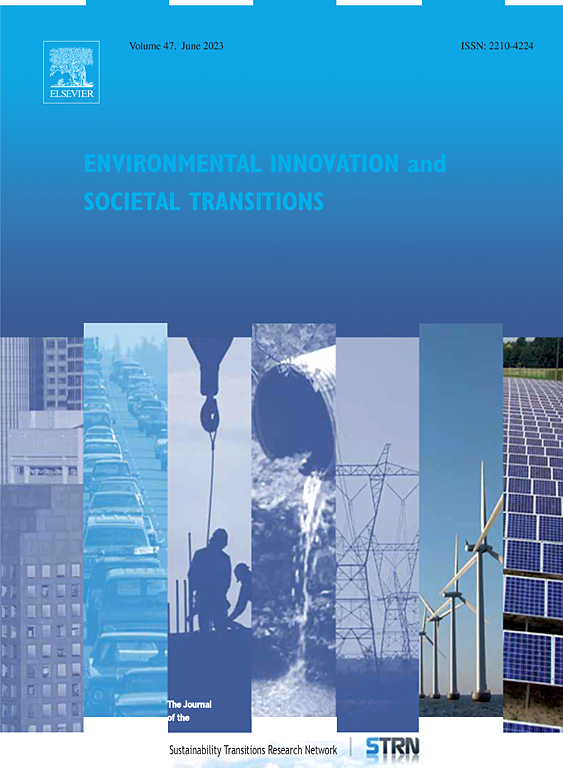Beyond temporary measures: How experiential learning in street experiments shapes urban mobility transitions
IF 6.1
2区 经济学
Q1 ENVIRONMENTAL SCIENCES
Environmental Innovation and Societal Transitions
Pub Date : 2025-05-28
DOI:10.1016/j.eist.2025.101007
引用次数: 0
Abstract
Tactical urbanism aims to rapidly transform urban environments through iterative experimentation. However, we know little about how learning shapes the long-term effectiveness and transformative potential of these interventions. This paper examines the role of local government implementers’ learning in sustaining tactical urbanism practices, specifically through the lens of street experiments implemented during the COVID-19 pandemic. Using experiential learning theory as a conceptual framework, we conducted and analysed interviews with 40 government representatives associated with 28 street experiments across 21 cities globally. Our analysis reveals three distinct learning processes among the implementers, arranged progressively: (1) implement and execute, (2) experiment and perpetuate, and (3) experiment and conceptualise. While implementers engaging primarily in the first two processes demonstrated responsiveness by leveraging tactical urbanism during systemic disruptions, they rarely generated transferable knowledge or sustained transformative impacts. By contrast, implementers who adopted the third approach – experiment and conceptualise – actively reflected on and generalised their experiences, leading to deeper learning and structural changes. These implementers effectively harnessed street experiments as catalysts for broader urban mobility transitions. By providing empirical evidence from diverse global contexts, this study advances our understanding of how learning processes influence the development of tactical urbanism projects. These insights could assist urban practitioners in seeking to embed meaningful, lasting change in urban mobility through iterative experimentation.
超越临时措施:街头实验中的体验式学习如何塑造城市交通转型
战术城市主义旨在通过反复实验快速改变城市环境。然而,我们对学习如何影响这些干预措施的长期有效性和变革潜力知之甚少。本文特别通过2019冠状病毒病大流行期间实施的街头实验,考察了地方政府实施者在维持战术城市主义实践中的学习作用。以体验式学习理论为概念框架,我们对全球21个城市的28个街头实验相关的40位政府代表进行了访谈并进行了分析。我们的分析揭示了实施者之间三个不同的学习过程,按顺序排列:(1)实施和执行,(2)实验和延续,(3)实验和概念化。虽然主要参与前两个过程的实施者通过在系统性中断期间利用战术城市主义表现出响应能力,但他们很少产生可转移的知识或持续的变革影响。相比之下,采用第三种方法(实验和概念化)的实施者积极反思和概括他们的经验,从而导致更深层次的学习和结构变化。这些实施者有效地利用街道试验作为更广泛的城市交通转型的催化剂。通过提供来自不同全球背景的经验证据,本研究促进了我们对学习过程如何影响战术城市主义项目发展的理解。这些见解可以帮助城市实践者通过反复的实验,寻求在城市交通中嵌入有意义的、持久的变化。
本文章由计算机程序翻译,如有差异,请以英文原文为准。
求助全文
约1分钟内获得全文
求助全文
来源期刊

Environmental Innovation and Societal Transitions
Energy-Renewable Energy, Sustainability and the Environment
CiteScore
13.60
自引率
19.40%
发文量
90
审稿时长
56 days
期刊介绍:
Environmental Innovation and Societal Transitions serves as a platform for reporting studies on innovations and socio-economic transitions aimed at fostering an environmentally sustainable economy, thereby addressing structural resource scarcity and environmental challenges, particularly those associated with fossil energy use and climate change. The journal focuses on various forms of innovation, including technological, organizational, economic, institutional, and political, as well as economy-wide and sectoral changes in areas such as energy, transport, agriculture, and water management. It endeavors to tackle complex questions concerning social, economic, behavioral-psychological, and political barriers and opportunities, along with their intricate interactions. With a multidisciplinary approach and methodological openness, the journal welcomes contributions from a wide array of disciplines within the social, environmental, and innovation sciences.
 求助内容:
求助内容: 应助结果提醒方式:
应助结果提醒方式:


